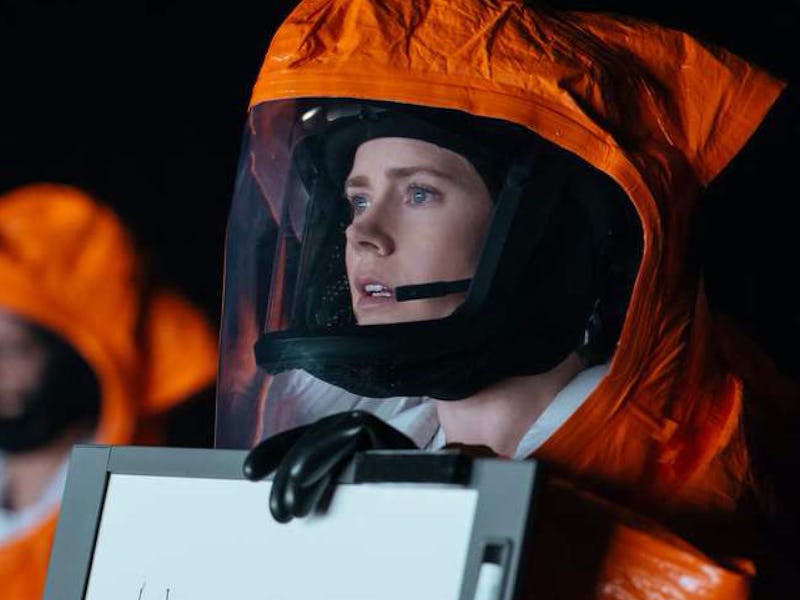In praise of hard science fiction's amazing decade
From The Martian to Arrival to Gravity, the 2010s reminded us that heroism comes down to brains.

The unexpected renaissance of the hard science-fiction movie is one of several trends from the decade that surprise us, even though we should have seen it coming.
In the 2010s, multiplex attendees enjoyed a revival of hard science-fiction, loosely defined as sci-fi that not only takes place within the realm of scientific possibility, but is narratively grounded by the process of space travel and exploration.
The template for hard science-fiction is 2001: A Space Odyssey, Kubrick’s 1968 adaptation of Arthur C. Clarke’s novel. Its influence looms over Alfonso Cuarón (Gravity), James Gray (Ad Astra), Christopher Nolan (Interstellar), Ridley Scott (The Martian), and Denis Villeneuve (Arrival). They’re a welcome departure from self-referential, Star Wars-style nostalgia, and a move toward an exciting, inspiring, modern, kind of science-fiction for climate-crisis-afflicted times.
Like 2001, modern hard science-fiction is only superficially about scientific procedure and survival: they’re all melodramas in space. In Ad Astra -- the most stylistically austere and generically pulpy of the recent hard sf bumper crop -- dune-buggy-riding space pirates, a feral baboon, and a Donald Sutherland cameo are memorable narrative detours as stoic astronaut Roy McBride (Brad Pitt) searches for his father in space.
Roy’s arc exemplifies the hard science-fiction movie’s tendency to turn survival narratives into cosmic therapy. There are exceptions -- The Martian, Gravity -- but most recent hard science-fiction protagonists use their professional skills to overcome trauma.
There are usually two layers to recent hard science-fiction movies: 1) the narrative as a technically-oriented procedural (i.e.: we follow space MacGyvers as they “science the shit out of” their problems); and 2) the protagonist’s quest for existential fulfillment. While a typical hard sf hero may be focused on procedure to survive, the only way they can succeed is by facing their deeply sublimated personal problems, which are almost always irritated by the presence of alien conditions. Ad Astra’s space pirates are not, in that sense, a bug, but rather a feature, of the modern hard science-fiction movie, a genre full of alienated workaholics who bury their feelings in their work.
Melodrama is the engine that powers hard science-fiction, not their Neil deGrasse Tyson-approved science. You can see it in Gravity, when Sandra Bullock conjures the ghost of her colleague Matt Kowalski (George Clooney), who encourages her when she’s on the brink of collapse. Melodrama’s also the thing in Arrival, where Amy Adams stops a world-ending conflict by shocking a general with his dead wife’s aspirational final words (“War doesn’t make winners, only widows”). And don’t forget Interstellar, where Matthew McConnaughey realizes that he’s a ghost haunting his daughter (Jessica Chastain), also an astronaut, so he helps her complete her mission by sending instructions in MORSE code through the twitches of her wrist watch’s second hand. In this context, Ad Astra’s rabid baboon is just one surreal narrative pivot among many.
Plausible concepts aren’t just narrative contrivances in hard science-fiction. The Martian’s survival-driven protagonist (Matt Damon) applies deductive reasoning in thrilling and easy-to-follow ways to dramatically illustrate that an understanding of scientific experimentation is vital. Even The Martian -- which feels like an atheist’s hard sf narrative compared to the others’ more agnostic or even semi-religious themes -- views being a scientist like a life-saving and even noble career path.
Matt Damon in 'The Martian'
What defines the last decade’s hard science-fiction is a tendency to use process-oriented survival dramas to gain a personal understanding of the role of scientific inquiry and the big picture questions it poses.
Hard science-fiction movies are only initially concerned with reducing macro-level threats and problems to micro-level solutions, and then ultimately about blowing up those procedures to humanize the people pushing scientific progress. Hard science-fiction is to science what Michael Bay is to war propaganda: they make it sexy by making it seem more human.
By focusing on what can be done and why it matters, popular science-fiction is now steering the genre away from the idea that heroism is only in the hands of exceptional and the predestined.
This essay is part of the Inverse Singularity Awards, a critics' poll and essay collection about the best genre movies of the 2010s.
See also:
Lupita Nyong'o's brilliance made Hollywood take genre seriously
A Girl Walks Home Alone at Night cracked open every cliche
J.J. Abrams was sci-fi's biggest booster, but is he any good?
Patrick Stewart's unlikely role made him the scariest villain of the decade
The best genre movies of the decade, by the numbers
The Wandering Earth capped off China's big decade
The Cabin in the Woods woke the horror gods
Planet of the Apes was the bravest blockbuster of the decade
The 10 best movie aliens of the decade
Unfriended was arguably the most important social media movie of the decade